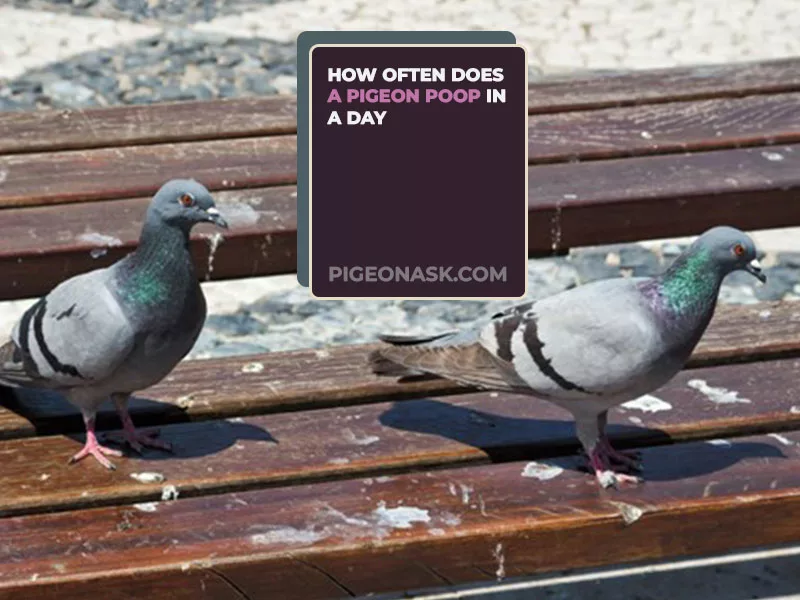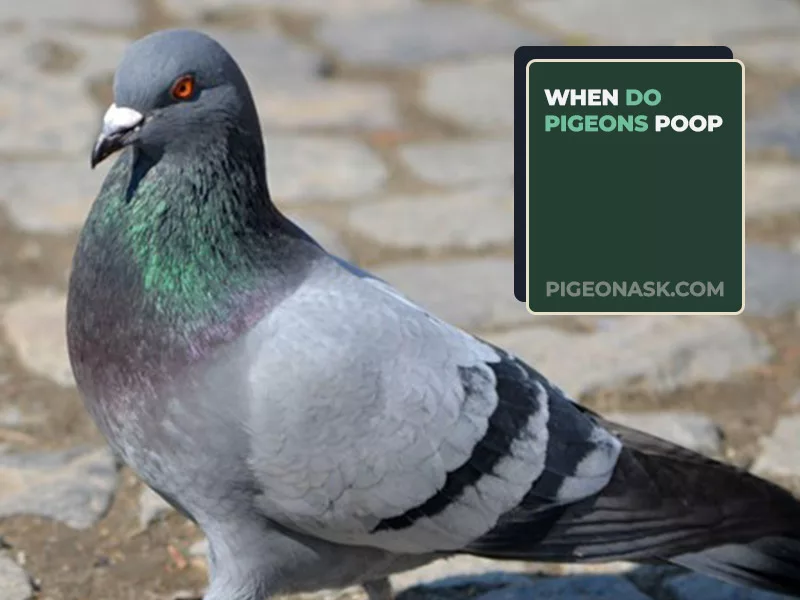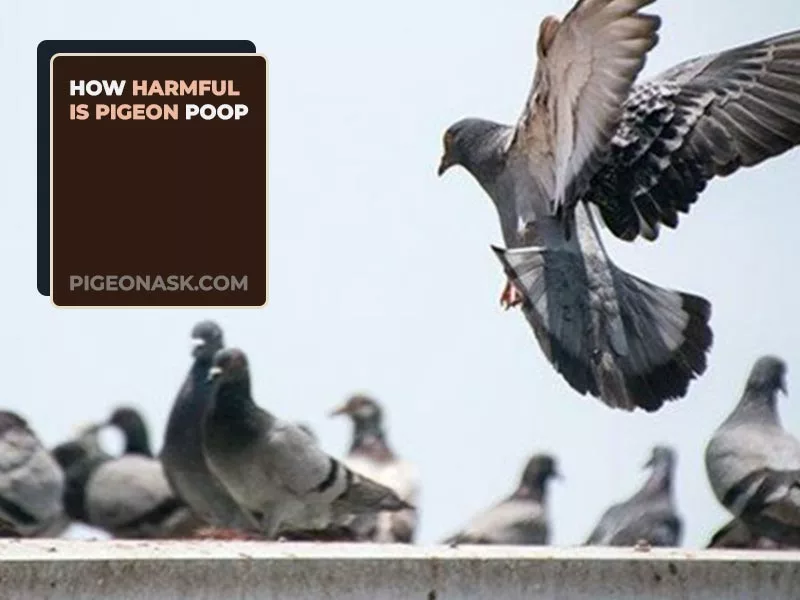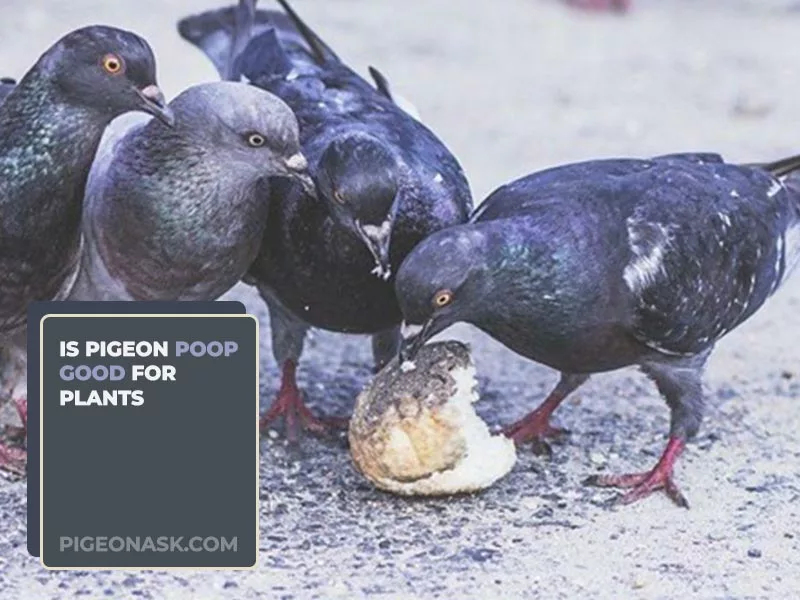Why Do Pigeons Poop So Much?
Pigeons have a nasty reputation for their habit of leaving droppings wherever they go, whether it be on cars, buildings, or even a human being minding their own business.
Nicknamed ‘Rats with Wings’ for their pest-like behavior of scrounging through trash to look for any junk to eat, it is no surprise that most people are not their biggest fans.
However, curious minds will ask themselves, why do pigeons poop so much? Well, if you are one of these curious minds, you have come to the right place! The short answer to why pigeons poop so much is simply that they have a pretty high metabolism.
This means that they digest food much faster than other animals, which makes them replenish themselves more frequently than you would expect for these small creatures. Of course, it also means they excrete more waste in the process.
For a more detailed and interesting answer, I encourage you to read this article further and find out!
Read more about pigeon habits:
Do Pigeons Poop More Than Other Birds?
Pigeons are considered to be urban animals, adapting seamlessly to the growing infrastructures and increasing human activity like no other animal.
Their favorite haunts are massive cities around the world. Due to this, they have had to adapt their diets to the fast progression of human civilizations too.

Pigeons are not the only animals with a high metabolism. In fact, most birds are known to have the same.
So why do pigeons poop so much? The problem is that, as pigeons have added variation to their diets based on human activity, they have begun to feed on food that is not completely digestible, especially for non-human digestive systems.
So naturally, they have to excrete a larger portion of the food they eat, and they constantly eat, which means they poop just as much!
We have covered an in-depth article on “Pigeon Habits“; if interested, you can check this article here.
How Often Does a Pigeon Poop in a Day?
As we mentioned previously, pigeons poop more than other birds simply because they feed on junk food more.
Other birds poop a lot too, but the time between can actually vary depending on their size and mass.

Larger birds poop less frequently than smaller birds, and pigeons definitely fall under the latter category, weighing less than 400 gm on average.
So, according to that information, pigeons can poop almost every 15 mins, depending on whether or not they have been munching on something at that time − and they usually have been.
However, this break in between can go up to 45 mins if the pigeon has not had more food at the time.
When Do Pigeons Poop?
We will subdue the urge to answer this question with “all the time” and provide you with a much more elaborate and eloquent answer.
Starting with when pigeons do pigeons not poop; which is when they are sleeping and when they are flying.

However, this also means that they are holding back their waste for this period of time. So they will be releasing more droppings than usual when they are wake up or land on the ground, respectively.
Pigeons are diurnal animals − animals that hunt, feed, and forage during the day and sleep at night.
This is why you will spot most new pigeon droppings early in the morning and then throughout the day but not at night. Pooping mid-flight would also completely unbalance the pigeons when they are flying, so they wait until they have landed to defecate in peace.
How Harmful is Pigeon Poop?
Pigeons have a bad rap for spreading diseases through their filthy habits, and rightly so.
Since they release droppings frequently and in inappropriate places, a lot of buildings suffer long-term damage to infrastructure.
We do not only mean in terms of the building’s aesthetics but also their structures as they are acidic and corrode metal and stone.

Additionally, and perhaps more concerningly, when the pigeon droppings have been left to dry, it is likely that it contains fungal and bacterial growth.
Studies have shown that these can cause up to 60 different diseases in humans.
Let us look at the two most common diseases known to be caused by exposure to dried pigeon poop.
Histoplasmosis
One of the more severe diseases that a human can contract from accidentally breathing dried pigeon poop particles is Histoplasmosis.
Histoplasmosis causes fungal infection in the lungs, and the symptoms include fever, fatigue, and chest pains 10 days after inhalation.
Most people recover from these diseases on their own with no medications. However, people with weakened immune systems, for example, someone with AIDS or recovering from an intrusive operation, may face mortal danger with diseases as severe as Histoplasmosis.
Cryptococcosis
Another disease most well-known to be spread through pigeon droppings is cryptococcosis. This is also spread through fungus and became a pretty daunting issue during the AIDS pandemic.
People with AIDS had a weakened immune system that led to death and suffering amongst these patients when they contracted cryptococcosis and were infected.
However, if you are a generally healthy person, your body will be able to deal with it on its own.
Is Pigeon Poop Good for Plants?
It isn’t all bad news for all the pigeon fanciers out there, voluntarily putting up with all the excessive excrement from their prized pets.
Pigeon droppings are quite well-reputed in history for being excellent fertilizers.

Pigeon poop, also known as Guano, is rich in nitrogen – an important component in fertilizers that provide plants with the important nutrients to aid in their growth and well-being.
Throughout history, pigeon excrement has been immensely popular amongst farmers and quite expensive too.
Until agribusiness had been developed, resulting in cheaper fertilizers, they had been sought after desperately for all the benefits it provided crops and plants.
Conclusion
So now you have the answer to the odd yet valid question; why do pigeons poop so much?
We hope that this article has been insightful and interesting, because pigeons − as common as they are − still quite mysterious to scientists.
Do not forget to like and share this article, and you can always connect with us through Facebook, Twitter, and Pinterest to know more about pigeon care, grooming, or just interesting facts!
Article References:
- Canada.ca/en/health-canada/services/pest-control-tips/pigeons.html
- Bangaloremirror.indiatimes.com/bangalore/others/pigeon-poop-causes-60-diseases/articleshow/51146177.cms
Image Credit:
- Photo from BBC
- Photo from Fit Day
- Photo from TheWeek.co.uk (Getty Images)
- Photo from Eton Etongroup.co.uk
- Photo By terkhomson from Canva.com/photos
